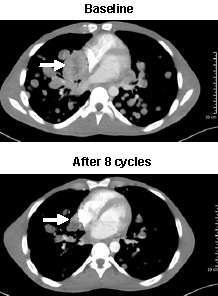Experimental drug beneficial in NIH trial to treat a rare sarcoma

(Medical Xpress)—Patients with advanced alveolar soft part sarcoma (ASPS), a rare cancer, achieved some control of their disease using an experimental anti-cancer drug called cediranib. The results from this largest clinical trial on ASPS to date were published online ahead of print on April 29, 2013, in the Journal of Clinical Oncology. The phase II trial was funded by the National Cancer Institute (NCI), part of the National Institutes of Health.
ASPS accounts for less than 1 percent of soft tissue sarcomas, cancers that originate in connective and supportive tissue, and occurs mostly in people ages 15 to 35. The tumor relies on the growth of new blood vessels to obtain oxygen and nutrients and to facilitate its spread to the lungs, brain, and bones. Surgical removal of these tumors is the recommended treatment. However, not all patients are candidates for surgical resection based on extent of disease or other conditions. Standard anticancer therapy has not been effective for treating patients with metastatic ASPS. The median survival time for patients with unresectable metastatic ASPS is 40 months, with a 5-year survival rate of 20 percent.
Cediranib is a drug that inhibits a class of proteins called vascular endothelial growth factor receptors which regulate blood vessel formation. The drug, developed by AstraZeneca, Wilmington, Del., has been tested in clinical trials against other cancers, including non-small cell lung cancer, kidney cancer, and colorectal cancer, with varying degrees of benefit.
The 43 patients with metastatic ASPS on the trial were given a 30 milligram oral dose of cediranib once daily until either their disease progressed or they developed significant side effects. To date, the objective response rate, which requires a more than 30 percent reduction in tumor size of target lesions, is 35 percent (15 of the 43 patients achieved a partial response). An additional 26 patients, or 60 percent, have stable disease.
"It's unusual to see such high rates of tumor shrinkage in a cancer that traditionally has not responded to standard chemotherapy treatments used for sarcomas," said Shivaani Kummar, M.D., NCI principal investigator for this trial. "Our ability to bring patients with ASPS from across the country to the clinical facility on the NIH campus for treatment has made it possible to rapidly test this new drug in this rare tumor."
To understand how cediranib works in ASPS and to identify abnormalities that may help in the selection of future therapies, tumor biopsy specimens were obtained before treatment and again during the first week of treatment. When the investigators compared gene expression in these two specimen groups, they discovered that the samples taken after treatment had lower expression of two genes that are important in regulating blood vessel development: ANGPT2 and FLT1.
Based on the encouraging responses observed in this trial, the researchers have initiated a follow-up trial that is comparing the effectiveness of cediranib to another vascular endothelial growth factor receptor drug, called sunitinib, in patients with metastatic ASPS.
More information: The clinical trials identifier for this study is: NCT00942877.














